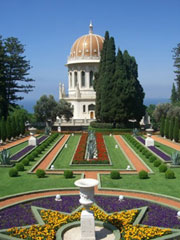Ravinder Kaur Nijjar
Standing on the soil of the land where the Prophets from different religions walked, and as the dust of the holy from past centuries intertwines with the air, I wonder why there is no peace here. This land, where faith, spirituality and peace should be emanating from every stone, seems only to have violence. The group of thirty consisting of religious leaders and members of seven faith communities, Sikhs, Buddhists, Bahai’s, Christians, Muslims, Jews, and Hindus have already become my family in the short time that it has taken to travel here.
 |
It has been a week of contrast, the presence of spiritual vibrations when visiting the most holy sites of major world religions - the Al Aksa Mosque, the Dome of the Rock, the Holy Sepulchre, the Western Wall, the shrine of the Bab and the violence existing side by side.
In this ‘Holy’ land the need for inter-faith co-operation and mutual understanding is so essential, and such a large inter-faith group from Scotland gave the Religious leaders from Jerusalem an impetus to meet. I found this incredible that the religious leaders, those who should be the first to promote peace, had taken so long to have dialogue. They are the ones who should be able to influence their congregations to extend the hand of friendship and challenge the politicians to make the right decisions for all the people.
Meeting so many different groups working for peace was heartening but there was also despair at the animosity, suspicion and hatred between people. But amongst all this conflict spiritual individuals who have developed the ability to see the Divine Light in all are working tirelessly for peace. And we should not underestimate the power that we have as an individual as shown by Ibtisam Hahamid a wonderful Muslim woman in Faradis. Ten years ago she fought extreme opposition from men to become Mayor of her Arab town and now she guides and empowers women locally and globally. Individuals like Sami Awad of the Holy Land Trust who is ‘fighting’ for a non-violent solution to the problems.
The young people with us added to the dynamic of the group, otherwise it would have been a lot of boring oldies together. However even the oldies group had their characters such as Acharyaji, the head priest from the Hindu Mandir in Glasgow who had very enlightening conversations with all of us although he only had limited English.
The camaraderie, the friendship and trust that developed so quickly between us as a group of diverse people, is the most important aspect before any inter-faith work can be done, and this was commented on by many of the people that we met. So in the Holy Land I believe that if lasting peace is to become a reality then the hand of friendship that is beginning to be extended will slowly lead to trust between the different communities. But those who will build that trust will have to be people of the different faiths, as their Founders are the ones who supported all, cared for all and loved the whole of humanity.
Ravinder Kaur Nijjar is a former Convener of the Scottish Inter-Faith Council; Sikh Representative and Executive Committee Member of UK Inter-Faith Network, and Co-Chair of Religions for Peace European Women of Faith Network.